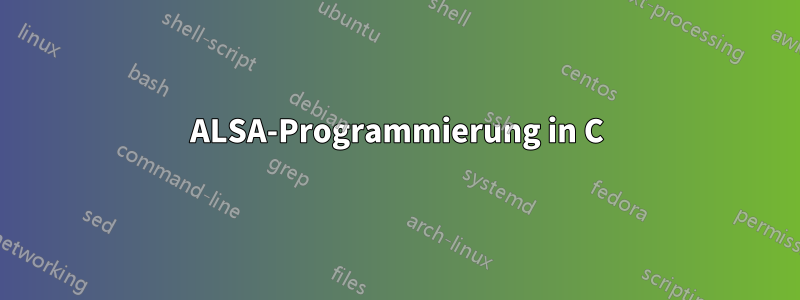
Ich verwende ein C-Programm, das mir beim Aufnehmen von meinem Audiogerät hilft. Hier ist der Code:
/* Use the newer ALSA API */
#define ALSA_PCM_NEW_HW_PARAMS_API
#include <alsa/asoundlib.h>
int main() {
long loops;
int rc;
int size;
snd_pcm_t *handle;
snd_pcm_hw_params_t *params;
unsigned int val;
int dir;
snd_pcm_uframes_t frames;
char *buffer;
/* Open PCM device for recording (capture). */
rc = snd_pcm_open(&handle, "default",
SND_PCM_STREAM_CAPTURE, 0);
if (rc < 0) {
fprintf(stderr,
"unable to open pcm device: %s\n",
snd_strerror(rc));
exit(1);
}
/* Allocate a hardware parameters object. */
snd_pcm_hw_params_alloca(¶ms);
/* Fill it in with default values. */
snd_pcm_hw_params_any(handle, params);
/* Set the desired hardware parameters. */
/* Interleaved mode */
snd_pcm_hw_params_set_access(handle, params,
SND_PCM_ACCESS_RW_INTERLEAVED);
/* Signed 16-bit little-endian format */
snd_pcm_hw_params_set_format(handle, params,
SND_PCM_FORMAT_S16_LE);
/* Two channels (stereo) */
snd_pcm_hw_params_set_channels(handle, params, 2);
/* 44100 bits/second sampling rate (CD quality) */
val = 44100;
snd_pcm_hw_params_set_rate_near(handle, params,
&val, &dir);
/* Set period size to 32 frames. */
frames = 32;
snd_pcm_hw_params_set_period_size_near(handle,
params, &frames, &dir);
/* Write the parameters to the driver */
rc = snd_pcm_hw_params(handle, params);
if (rc < 0) {
fprintf(stderr,
"unable to set hw parameters: %s\n",
snd_strerror(rc));
exit(1);
}
/* Use a buffer large enough to hold one period */
snd_pcm_hw_params_get_period_size(params,
&frames, &dir);
size = frames * 4; /* 2 bytes/sample, 2 channels */
buffer = (char *) malloc(size);
/* We want to loop for 5 seconds */
snd_pcm_hw_params_get_period_time(params,
&val, &dir);
loops = 5000000 / val;
while (loops > 0) {
loops--;
rc = snd_pcm_readi(handle, buffer, frames);
if (rc == -EPIPE) {
/* EPIPE means overrun */
fprintf(stderr, "overrun occurred\n");
snd_pcm_prepare(handle);
} else if (rc < 0) {
fprintf(stderr,
"error from read: %s\n",
snd_strerror(rc));
} else if (rc != (int)frames) {
fprintf(stderr, "short read, read %d frames\n", rc);
}
rc = write(1, buffer, size);
if (rc != size)
fprintf(stderr,
"short write: wrote %d bytes\n", rc);
}
snd_pcm_drain(handle);
snd_pcm_close(handle);
free(buffer);
return 0;
}
Um die Ausgabe des Programms zu speichern, muss ich Folgendes verwenden:
gcc record.c -o out -lasound
./out >sound.raw
Mein Problem ist die letzte Zeile. Ich möchte innerhalb des Programms sein. Das heißt, die Umleitung der Ausgabe sollte überhaupt nicht erfolgen. Das Programm wird ausgeführt und speichert die Daten! Irgendeine Idee, wie ich das machen kann?
Vielen Dank im Voraus für jede Hilfe!
Antwort1
Der write(1, ...Aufruf schreibt in die Standardausgabe. Ändern Sie ihn so, dass in eine Datei geschrieben wird.
(Und diesem Programm fehlt die Fehlerbehandlung für alle setFunktionen.)


